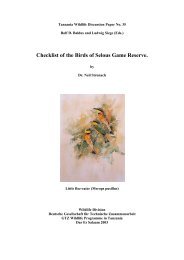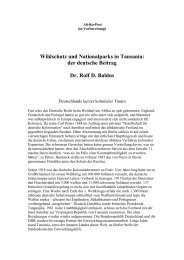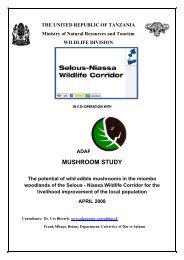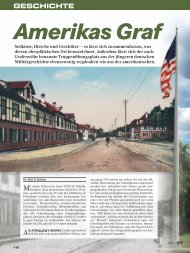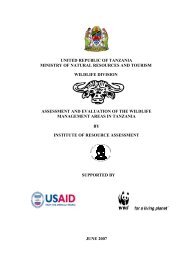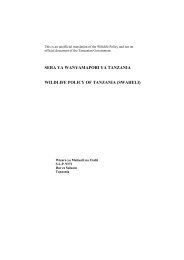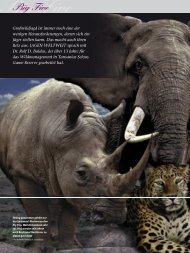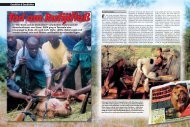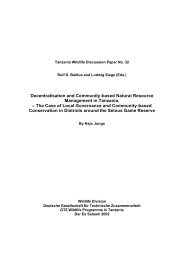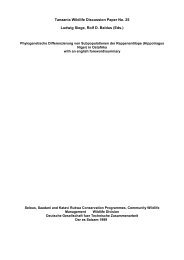African Indaba Articles - wildlife-baldus.com
African Indaba Articles - wildlife-baldus.com
African Indaba Articles - wildlife-baldus.com
Create successful ePaper yourself
Turn your PDF publications into a flip-book with our unique Google optimized e-Paper software.
Hunting for Conservation in CameroonBy Jeff Sayer, WWFOn the edge of the rainforest in southeast Cameroon, Baka pygmies from the village of Lantjoue arehaving a party. Everyone is dressed in their finery and the drums are beating. A feast of yams, plantains,freshly caught fish, and a big pot of antelope stew is spread out in the village school room. The reason for theparty? The arrival of new desks and equipment for the school, paid for by a <strong>com</strong>munity hunting project thatthe villagers set up with help from global conservation organization WWF."It may seem surprising to find a conservation organization supporting hunting," says WWF’s LeonardUsongo. "But <strong>com</strong>mercial hunting for bushmeat has be<strong>com</strong>e such a problem here that we had to trysomething new to control it. One approach is regulated hunting.” Lantjoue is typical of the small <strong>com</strong>munitieson the fringes of Cameroon’s rainforest. The Baka and Bantu people have lived here for generations,growing crops, working in the logging concessions, and hunting and gathering in the forest."The people here have always hunted for their own needs," says Usongo. "But in the last couple ofdecades new roads have been opened, mostly for logging, and there are lots more trucks heading for thecities. Local hunters can sell bushmeat to passing truck drivers for more money than they could ever havedreamed of a few years ago. This has fuelled a huge increase in hunting, including some animals that areendangered — like gorillas.” The truck drivers sell the meat in the markets of Yaoundé and Douala. Thetrade is so lucrative that it has attracted people from other parts of the country, who now poach animals inthe forests. “We tried working with Cameroon's Ministry of Environment and Forests to stop the trade,” saysUsongo, “but there are too many trucks and too many roads.”The new approach is to help local people manage hunting. Instead of government-imposed rules aimed todiscourage hunting for the bushmeat trade, the villagers of Lantjoue can instead regulate their own huntingquotas in a defined village hunting zone.One incentive to keep <strong>wildlife</strong> abundant is foreign trophy hunters. Among many other species, the forestaround Lantjoue is home to the elusive bongo antelope (Tragelaphus euryceros). Trophy hunters areprepared to pay large sums of money for one of these magnificent animals with spiraling horns. These richforeigners want to be sure that they will find a bongo during a fairly brief visit. If the villagers can guaranteethis, then the trophy hunters will <strong>com</strong>e to their forests. Under the project set up by WWF, the villagers mustlimit their own hunting and ensure that lots of bongos can be found in their forest. The trophy hunters pay alarge license fee, part of which is returned to the villagers to pay for improvements such as the equipment forthe school. Diopim Akanda, the village chief, is happy. "As long as we can keep outside poachers away, wecan find enough animals for our food and still attract the foreign hunters, who pay us more than we could getselling bushmeat to passing truck drivers.”A small group of Baka pygmies have set up a camp next to the village, and act as guides for the trophyhunters. "The pygmies have an astonishing knowledge of <strong>wildlife</strong>,” says Usongo. “It’s fascinating to spend aday in the forest with them. You see things that you would never see on your own; they understand thehabits of the animals amazingly well. There are gorillas, chimpanzees, and a wealth of other species to beseen. We hope that in the future, ordinary tourists will <strong>com</strong>e to shoot with their cameras rather than withguns".Adjacent to the village hunting zone is a large logging concession run by a Belgian family. Manager JulesDecolvenaere has also joined forces with WWF. "We are keen to get our timber certified under the ForestStewardship Council (FSC)," he says. "We think that we already meet most of their standards forenvironmentally and socially responsible forest management. We also try to protect <strong>wildlife</strong> but it is verydifficult, and conservation groups will criticize us if poachers <strong>com</strong>e into our concessions." Decolvenaerewel<strong>com</strong>es the new village hunting zone and supports the WWF initiative. It’s also a matter of professionalpride for Decolvenaere. “My family has been working these forests for over 30 years,” he says. “We are keento demonstrate that our industry can be good for the forest and good for the local people."To help the efforts to restrict hunting, the logging trucks returning from the cities now bring frozen meatback to the concessions. Decolvenaere says, "we pay our staff well and we want them to share our goal ofbeing a responsible environmental <strong>com</strong>pany — so we practice good logging and we protect <strong>wildlife</strong>".36



